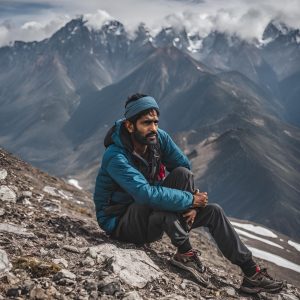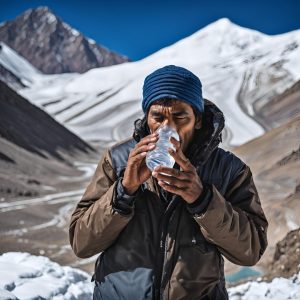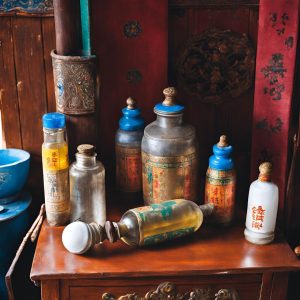Guide for prevention, symptoms and treatment of altitude sickness at Kailash mansarovar
High-altitude sickness, also known as Acute Mountain Sickness (AMS), is a common worry among travelers visiting high-altitude sites such as Kailash Mansarovar. When you go to higher altitudes, with a decrease in oxygen levels that can give rise to a variety of symptoms. Although this is an instinctive reaction, but during the Yatra it is important to understand how to prevent, identify and treat altitude sickness. Here’s an in-depth guide on how to cope with AMS on your pilgrimage.
What Is Altitude Sickness?
At higher altitudes, 8,000 feet and above, the level of oxygen in the air is decreased so your body has a harder time obtaining the oxygen that it needs. Since Kailash Mansarovar Yatra is in high altitudes and you are going higher and higher during the yatra especially during parikrama of Mount Kailash, you might show symptoms of altitude sickness.
 Symptoms of AMS can be mild or severe and include:
Symptoms of AMS can be mild or severe and include:
- Headache
- Nausea and vomiting
- Dizziness or lightheadedness
- Shortness of breath
- Fatigue and weakness
- Loss of appetite
- Insomnia
What Causes Altitude Sickness?
When you, however, go up to the high altitudes, the body needs to acclimatize due to the lesser oxygen levels. If you don’t give your body sufficient time to acclimatize, you may develop AMS. Risk Factors for AMS: Rapid Ascension, Physical Exertion, Dehydration, and Pre-Existing Condition
How to Avoid Getting Altitude Sickness ?
Ascend Gradually
The best way to avoid altitude sickness is to go slowly, so you give your body time to get used to the altitude. Don’t climb to altitude too fast and try to adhere to a climb high, sleep low strategy, where you spend time at intermediate altitudes during the day and descend to a lower altitude to sleep.
- Stay Hydrated
- Deficiency of water worsen the AMS symptoms. Stay fully hydrated throughout your journey with 3-4 liters of water per day, but avoid caffeine and alcohol as these can aid dehydration.
- Avoid Overexertion
- The Yatra can be physically challenging, and it’s important to take things at your own pace. During the first few days of your trek, don’t push too hard.
- Proper Rest
- You also need to take rest and sleep for brief intervals to avoid overexertion and improve your oxygen levels.
- Eat Light and High-Carb Meals
- Your body has to work harder after a heavy meal, so do yourself a favour and eat light meals that are easy to digest and include carbs. This energizes your body but does not burden your digestive system.
- Avoid Alcohol and Smoking
They also both deplete oxygen levels in the blood, which makes it more difficult for your system to acclimatize to high-altitude conditions. Hold off on drinking alcohol and skip smoking while traveling.
Identifying Symptoms and What to Do About Them ?
Altitude sickness may still occur even with the best precautions. You should be able to identify symptoms early on and act promptly.
 Mild Symptoms
Mild Symptoms
If you have headache, nausea or fatigue, you can often treat them by:
- It is a period of rest in the present elevated state.
- Drinking plenty of fluids.
- Using pain relief medication such as Paracetamol
- Oxygen therapy (in some areas, portable oxygen may be available).
Moderate to Severe Symptoms
If symptoms get worse or if you experience shortness of breath, vomiting, or dizziness, it’s important to:
- Make an immediate descent to a lower altitude.
- If the symptoms don’t improve after resting or descending, seek medical attention.
- Take Diamox (acetazolamide) to help the body adjust to high elevations. You should always consult with your doctor prior to taking any medication.
Severe AMS or HAPE/HACE
AMS can at times progress to High Altitude Pulmonary Edema (HAPE) or even High Altitude Cerebral Edema (HACE). Signs include severe shortness of breath, confusion or loss of consciousness. These are life-threatening diseases that must be immediately descended to and treated in the hospital. If you or anyone you’re traveling with displays signs of HAPE or HACE, descend as quickly as you can and seek emergency medical treatment.
 Medications for Altitude Sickness
Medications for Altitude Sickness
- Diamox (Acetazolamide) Diamox is commonly prescribed for AMS prevention and treatment. It allows the body to climatize better such as increasing respiration, which allows for greater absorption of oxygen. But you need to check with your doctor that it’s safe for you.
- Pain Relievers
- Headaches or body aches can benefit from Paracetamol or Ibuprofen. These can help relieve some minor side effects of altitude arthritis.
- Oxygen Canisters
- There are portable oxygen canisters available in some parts of the Yatra route, so, if you feel breathless or weak in high altitudes, carrying one around with you can help.
When to Get Medical Attention at Kailash yatra
While AMS can usually be managed by taking basic precautions, some signs are a signal that you need professional medical help:
- Ongoing headache that isn’t relieved with rest or pain medications.
- Trouble breathing, even while resting.
- Severe nausea or vomiting.
- Lack of balance or confusion (symptoms of HACE or HAPE).
In such circumstances, it is of absolute importance to descend immediately to a lower altitude and obtain medical care.
Conclusion
Altitude sickness is a prevailing concern during the Kailash Mansarovar Yatra, but with due preparation, prevention, and knowledge, you can reduce the risk and manage any symptoms efficiently. Always listen to your body and never shy away from getting help if required.
You can fully experience the spiritual and physical aspects of the Yatra by keeping yourself well hydrated, taking it slow, and using medication as needed.
Do you want to know more about medication, or acclimatization tips during Yatra? You let me know, and I’ll be happy to help!
